Use 'Print preview' to check the number of pages and printer settings.
Print functionality varies between browsers.
Printable page generated Monday, 23 February 2026, 4:18 AM
Study Session 7 Role of Frontline WASH Workers
Introduction
The various infrastructures and systems involved in provision of WASH services include water supply and distribution systems, and latrine and waste management facilities (Study Sessions 2 and 3). These are planned, developed, installed and maintained through the active involvement of a number of frontline WASH workers. This study session describes the roles of different types of key frontline WASH worker in these practical aspects of WASH provision. It also explains why facilitation is an important skill for WASH workers and provides guidance on how it should be done.
Learning Outcomes for Study Session 7
When you have studied this session, you should be able to:
7.1 Define and use correctly each of the key words printed in bold. (SAQs 7.1, 7.2 and 7.3)
7.2 Identify the key frontline workers responsible for promoting adequate access to and utilisation of WASH services. (SAQs 7.1 and 7.2)
7.3 Describe their roles in promoting and facilitating improved WASH services. (SAQs 7.1 and 7.2)
7.4 Outline ways in which you as a frontline worker could help to improve WASH situations through facilitating community meetings. (SAQ 7.3)
7.1 Who are frontline WASH workers?
There are many people involved in the provision of WASH services, from planning and construction to operation and maintenance. For example, engineers, health workers, social development and economic professionals, community leaders, community mobilisation experts, builders, contractors, and many others are involved. They contribute from town level, to zonal or regional level, and, depending on the scale of the project, to federal level. Even small projects such as construction of public latrines involve many different stakeholders including user communities, private contractors, town municipalities and utilities.
Frontline WASH workers are those who work closely with the beneficiaries of a scheme. Their role focuses on WASH service provision and maintenance. They mobilise urban communities to work towards improved personal hygiene and environmental sanitation, and promote proper care and utilisation of WASH infrastructure. They include health workers and those who operate WASH infrastructure and provide the necessary care and maintenance to WASH services, such as trained technicians, operators and facility administrators. All are important, irreplaceable contributors who improve and sustain basic services in urban areas.
Which of the following would be frontline WASH workers? Urban Health Extension Workers, members of the Health Development Army, woreda water experts, WASH facility operators, plumbers, mechanics, technicians and sludge collection operators.
Which do you think would be the most crucial for improving and sustaining WASH services in your locality?
All these are frontline WASH workers. The most crucial groups will vary from project to project, but are likely to be the Urban Health Extension Workers, members of the Health Development Army, woreda water experts, and both public and private WASH facility operators.
If these crucial groups of workers are absent, inadequately trained or not undertaking their daily tasks effectively, access to urban WASH service facilities will be restricted or reduced. In extreme cases, WASH facilities may break down altogether leading to total lack of WASH services.
The following sections outline the roles of the key groups of frontline workers.
7.2 Role of Health Extension Workers
Health Extension Workers (HEWs), are usually graduates of Technical and Vocational Education and Training Colleges (TVETCs) or Health Science Colleges. They are trained to promote preventative healthcare practices among communities, undertaking community outreach activities and conducting house-to-house visits to provide important information, knowledge and skills on important health-related topics.
HEWs undertake 16 essential health packages that can be grouped into three key areas:
- disease prevention and control
- family health
- hygiene and environmental sanitation.
Promotion of safe and healthy practices in relation to infant care, nutrition, immunisation, growth monitoring for babies and family planning advice are among the many services in the first two areas above that HEWs undertake. They provide these services during house-to-house visits or at health posts or health centres. Here we focus on their hygiene and environmental sanitation work.
The health packages that relate to major WASH issues are:
- Excreta disposal: Human faeces is a major health risk (Study Session 2). HEWs provide information and guidance on how human excreta can be safely managed and disposed of through the construction and use of appropriate latrines.
- Solid waste and domestic liquid waste disposal: HEWs discuss health and environmental issues caused by solid and liquid waste produced at household level, their risk to community health, and how they can be safely managed.
- Water supply and safety measures: Contaminated water is a major cause of transmission of waterborne diseases that cause diarrhoea. HEWs explain how water can be handled safely to avoid contamination during transport and storage and how contaminated water should be boiled or treated using chemicals.
- Food hygiene and safety measures: Food can transmit disease if proper hygiene and safety measures are not practised. HEWs demonstrate safe practices for preparing and storing food.
- Healthy home and environment: HEWs demonstrate how family members can take care of their home and its surroundings to ensure a clean and safe environment.
- Control of insects and rodents: These are not only a nuisance, but may also transmit diseases. HEWs teach possible methods to control and prevent the breeding of these animals in and around the household.
- Personal hygiene: Finally, HEWs promote the importance of keeping and maintaining good personal hygiene, particularly emphasising handwashing before coming in contact with food and after using the latrine, and the importance of washing faces to protect from eye infections.
HEWs promote all these recommended practices in urban communities (Figure 7.1). They work to ensure that all health extension packages are implemented at a household level, including the seven listed, through training of model families. They may use youth associations and traditional cooperative associations such as idir, ekub and mahiber to promote community involvement. They also work with students in schools to promote proper sanitation and hygiene practices.
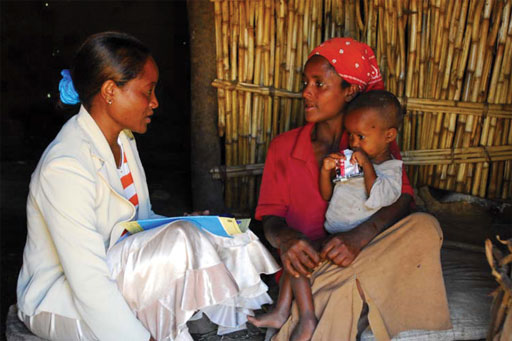
7.3 Role of the Health Development Army
The Health Development Army(HDA) is another key group with a significant role in WASH. You may already be familiar with them as enormous numbers of people are involved. They are organised groups of families who promote healthy activities and behaviour among other families. More than 2.25 million HDA families have been mobilised in Tigray, Amhara, Oromia and SNNP regions (Figure 7.2). Since 2010/11, the Ethiopian government has invested a lot in establishing the HDA who have made a huge contribution to the major achievements made in the health sector, including reduction of the number of deaths in children under five. HDAs are regarded as the key players in the attempts to achieve government targets in the Health Sector Development Programme (HSDP).

The smallest unit of the HDA consists of six households organised together and is referred to as a one-to-five (1–5) network. One of the households is a model family who have mastered and implemented some or all of the WASH packages such as access to an improved latrine, handwashing and solid waste management. Usually it is mostly the women who are involved. The family head of the model household leads the 1–5 network. Five of these networks are organised into a larger team comprising 30 households in the same neighbourhood. The leaders of these teams undergo intensive training over seven to ten days to ensure that they fully understand their tasks. The HEWs, described in Section 7.2, facilitate the establishment of these teams and in collaboration with the health centres, provide training for the team leaders.
The main task of the HDAs is implementing the components of a Health Extension Package in each household. These are first adopted in the model household and then cascaded to the other families in the 1–5 network. To achieve this, the 1–5 networks meet every week to:
- identify the major bottlenecks and gaps in implementing the WASH improvement components of the Health Extension Package
- prioritise gaps and agree on strategies to address them
- review progress.
This process has accelerated achievements in achieving HSDP targets, notably the use of health facilities by mothers with newborn babies. It has also successfully increased knowledge and practice of safe hygiene and sanitation practices among households, including construction of basic or improved latrines at household level, improved personal hygiene, waste management, and safe handling and storage of water.
In summary, HDAs work to change practice in communities through a participatory process of learning and action-oriented meetings, working below HEWs at neighbourhood and family levels. They are the key players in the improved WASH situations that many households enjoy today and will continue to be an important part in future progress towards improved and sustainable WASH services in communities.
7.4 Role of woreda water experts
Woreda water experts in urban settings focus mainly on providing support to ensure continuous water supply to communities. They regularly:
- provide technical support to facility managers and operators, such as utilities in medium and large towns, WASH Committees (WASHCOs) in small towns
- provide training to facility managers and operators on operation, maintenance and tariff setting
- provide supportive supervision to ensure utilities and WASHCOs are operating and managing facilities properly
- conduct minor or major maintenance to water supply facilities, depending on their skills and expertise
- conduct water quality checks at different points in the water supply and distribution system and on any alternative sources that the community is regularly using.
Woreda water experts are sometimes asked to address WASH facility management issues. This usually calls for community meetings to identify issues and decide on appropriate actions. On these occasions, the woreda water experts work closely with communities to develop and implement participatory plans (Figure 7.3).
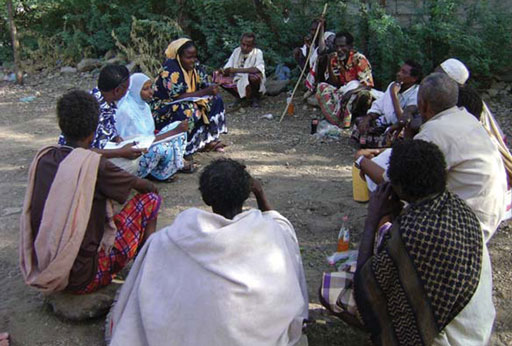
7.5 Role of private operators
Private operators and service providers are also frontline workers who play a key role in making WASH services accessible to communities.
Private suppliers may supply WASH-related products such as soaps, sanitary pads and household water treatment chemicals or sachets such as Bishan Gari and Wuha Agar.
Privately hired technicians may provide maintenance services for water distribution systems, mainly in household connections and related plumbing tasks. In smaller towns, they also provide minor operation and maintenance of the water supply system, for example they may be called in to repair electromechanical components.
Micro- and small enterprises (MSEs) are increasingly participating in the WASH sector (see Study Session 3). Many towns in Ethiopia use the services of MSEs to collect solid waste from households and transport it to a centralised collection site or sometimes to final disposal sites.
In some towns, the service by MSEs has grown to include septic sludge emptying using vacuum trucks (Figure 7.4).
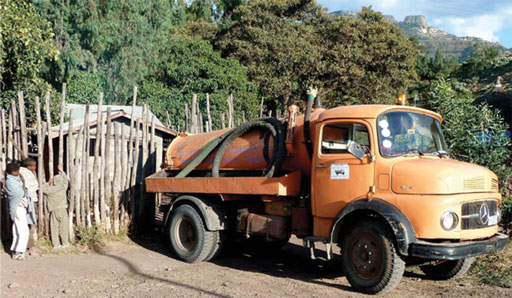
Others are selling items for household use (Figure 7.5), or producing and selling pre-cast concrete slabs for use in household latrines (Figure 7.6).
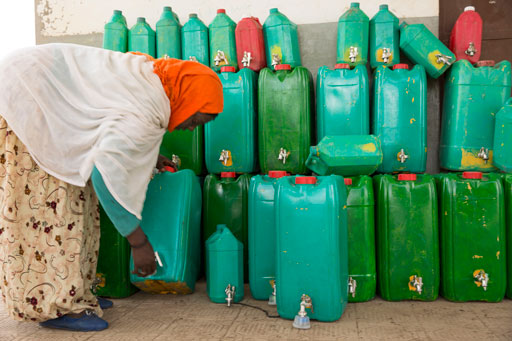
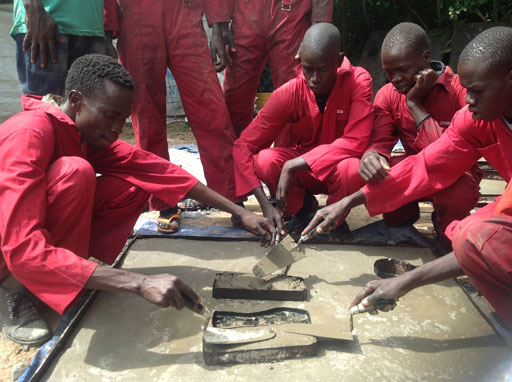
The number of private operators is growing, although they currently provide only a small proportion of WASH services. Organised groups are managing public WASH facilities, such as public showers and latrines, which have been constructed by NGOs or other development partners. Other private operators include water vendors (Figure 7.7) and informal waste collectors like the cart that you saw in Figure 3.1 in Study Session 3.
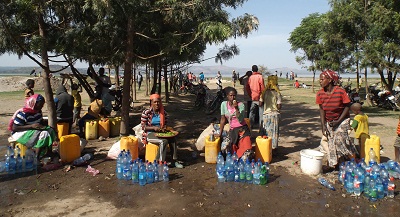
Private sector participation is still developing in Ethiopia. Urban settings and their communities provide a number of opportunities for entrepreneurs. The government of Ethiopia encourages private sector initiatives and provides start-up support to promote improved service delivery. Government partners are also investigating innovative approaches and best practices from other countries, to accelerate private sector participation in the WASH sector.
With time, urban communities will benefit more from services provided by the private sector, as the public sector shifts its focus to regulation of the services.
Which frontline workers play the following roles?
- Work below HEWs at neighbourhood and family levels through a participatory process including action-orientated meetings.
- Management of public WASH facilities.
The answers are as follows:
- HDA members work below HEWs at neighbourhood and family levels.
- Private operators usually manage public WASH facilities.
7.6 Role of frontline workers in facilitation
The communities are the ultimate users of WASH services and they are the ones who probably know more about their situation and understand their problems better than anyone else. The role of frontline workers is to provide adequate information to the community and facilitate the process for them to make informed decisions about their actions. You may find that, as an additional frontline worker, part of your role is to facilitate the process that leads to a solution that is acceptable by all.
Facilitation means helping groups of people to understand and agree on their objectives. It involves engaging communities in a process, as you learned in Study Session 6.
Initiating sustainable change to improve WASH services requires full understanding of the existing situation, the barriers to improvement and the available resources. The commitment for change must come from within the communities themselves. Change should not be imposed externally. Frontline workers, while working with communities, should avoid imposing a new regime, otherwise the desired changes will not happen or will not be sustained. Mobilising communities for positive action and sustainable change without imposing solutions on them requires specific skills in the processes of facilitation.
7.6.1 What are facilitation skills?
Facilitation skills are skills used to direct and guide important processes with groups of people. These processes can involve meetings, discussions and planning sessions or training events. Somebody needs to guide these processes to make sure the objectives are met. This person is called the facilitator.
The facilitator plays a key role in the success of a community meeting. He or she ensures that ideas raised by participants are coherent with the main agenda of the meeting and works towards finding an agreeable consensus solution to the problem at hand. A good facilitator also ensures that all present are participating adequately in the process and their voices are heard (Figure 7.8).
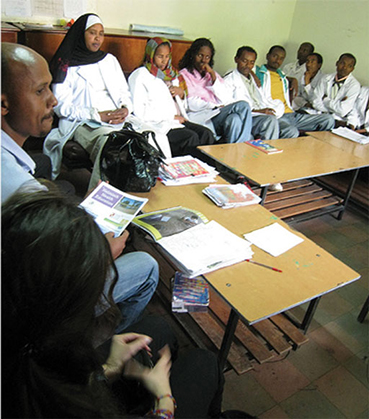
Facilitating is different from chairing a meeting. Neither is it teaching, giving orders or prescribing solutions. It means encouraging of the flow of ideas and systematically drawing the discussion to a conclusion that addresses the agenda.
A facilitator has three main roles:
- To guide a group of people to move through a process together. A facilitator does not give opinions, but encourages others in the group to voice theirs.
- To focus on achieving solutions, but also on how people participate in the process.
- To remain open and neutral throughout the process and not to take sides.
7.6.2 Key steps to facilitating a meeting
There is no specific formula for conducting effective facilitation. However, there are a series of steps that should generally be included, though their order may vary depending on the context.
Introduction
Always introduce yourself and anyone who has accompanied you by giving your name(s) and explaining your role. This helps put participants at ease so that they are not meeting with strangers. Explain the purpose of the meeting and what it seeks to achieve.
Set the agenda
Clearly state the problem that needs to be addressed and explain how it affects those present. Everyone must understand what is at stake. List the discussion points and ask participants if they would like to change or add any.
Ground rules
Sometimes it helps to set ground rules for the group process. This is especially important when conflicting interests are expected. Setting and agreeing on ground rules is not mandatory but can help you to have more control over the process. Try to start meetings on time as much as possible. Waiting for latecomers is not fair on those who arrived promptly and encourages people to be even later next time. If some key participants are late, explain firmly that you had to start the meeting without them because of the need to finish on time.
Encourage participation
Remember that you are a facilitator, not a participant. Refrain from giving opinions, taking sides or prescribing solutions. Instead, provide resources, information and strategies to guide participants to give their views and reach a solution.
Some participants may be more vocal than others and some may try to dominate the discussion. Be firm and encourage everyone to share ideas and observations to ensure that voices of all those present are heard. Remember that those members of the community who are poor or disadvantaged in some way may not willingly speak out. It is important to hear their views, because the objective is to facilitate a community-wide commitment.
Rarely, some participants may ridicule or try to undermine opinions from vulnerable groups. Your ground rules may be useful in such circumstances.
Stick to the agenda
Do not deviate from the agenda. Some participants may be focused on points that are not on the agenda and may repeatedly raise them. Keep reminding them of the need to stick to the agenda. If this does not work, ask the group to help you decide on the appropriate process and encourage them to support you.
Always build towards actions
Look out for any ideas from the participants that could lead to appropriate actions. Actions should be practical and achievable with available resources. Remember that this is the aim of the meeting and the reason why you got the groups together in the first place.
The actions must be accomplished by responsible bodies and a definite time should be set in which to complete them. Your objective is to build a plan with clear actions, which specifies the person or group that is going to perform each action and the time by which it should be completed. Make sure individuals or groups are willing to take responsibilities for the identified actions and guide them to agree on the necessary time to complete them.
Reiterate solutions/agreements reached
Ensure that participants understand and agree to the identified actions. State a complete action statement on each issue after agreement is reached and ensure all participants agree to it, before proceeding to the next agenda item.
Propose follow-up meetings
Before concluding the process, summarise agreed actions and ask participants to agree on a follow-up mechanism. This could be another meeting or a series of follow-up meetings at regular intervals for the group to update each other on progress.
Conclude the meeting
Thank everyone for their participation and for the achievements of the process. Take a moment to thank the people who assisted in setting up the meeting and those whose input required preparation beforehand. Close the meeting on time. Members of urban communities normally have a busy life and appreciate a meeting that keeps to schedule.
These are only guidelines and you may need to be flexible to accommodate variations. Case Study 7.1 illustrates a slightly different facilitation approach.
Case Study 7.1 Addressing school sanitation issues
As part of an urban sanitation project to address school sanitation issues, a planning session was initiated in a small town in Welaita zone of SNNPR by the implementing NGO.
The participants for the session came from different government offices, including municipality, water desk and health office, and also the parent teacher association (PTA), kebele administration and the schools themselves. The facilitator introduced himself and the NGO he worked for. He allowed enough time for participants to introduce themselves and the offices they represented. Then he briefly introduced the urban sanitation project and explained why the planning session was important.
Participants had been sent in groups to visit selected schools prior to the meeting and to record their own assessment of the situation. They used observations and interviews with both students and teachers.
First, the facilitator asked participants to share their findings and list the major issues they had identified during their visit. The most pressing issues identified were lack of access to water, open defecation and solid waste accumulation in the school premises.
The facilitator asked participants to identify the key stakeholders among the participants themselves, who could act on these issues. After some discussion, the group identified the school principals and members of the PTA, school WASH clubs, the woreda education office, health office and the water desk.
Next, the facilitator asked all participants to link each of the identified issues to no more than one responsible stakeholder as a primary contact to address each issue. For example maintaining latrines was assigned to the PTA; providing access to water was assigned to the water desk in the municipality. Ending open defecation and managing solid waste was assigned to WASH clubs, with the support of the health and education offices.
The facilitator summarised the process so far, and reiterated which issues were assigned to which stakeholders. He then asked the identified stakeholder for each issue to outline clear actions to solve it, their resource requirement, and a reasonable time for completion for each action. He encouraged them to prioritise actions where necessary and present their plans to the larger group.
The planning session was completed with clear action plans to improve the WASH situation in the visited schools and a follow-up mechanism to track progress.
What is different about the approach used in this case study, compared with the approach outlined in Section 7.6.2? In particular, how were the issues or problems identified? Do you think that this different approach worked well?
The facilitator used the inputs from the participants to identify the key issues or problems, instead of drawing up an agenda beforehand. However it worked well in this instance, probably because the participants had been given responsibility for identifying the problems from their own observations.
As a frontline WASH worker, much of your work may involve organising communities and conducting group meetings, planning sessions and discussions. If you manage to develop and apply good facilitation skills, communities will:
- become increasingly comfortable about participating in your meetings
- take responsibility and ownership of the outcomes
- develop sustainable solutions.
In the process, you will build a good reputation among the communities and get their trust, which is crucial for your success in addressing more issues in the future.
Remember that facilitation skills – just like any other skills – are mastered with practice.
Summary of Study Session 7
In Study Session 7, you have learned that:
- Frontline WASH workers are people working closely with the users of WASH facilities. Their role focuses mainly on mobilising communities towards improved practices of WASH. They also work with the community to provide adequate care and maintenance of the WASH facilities for sustainable service.
- The key frontline workers in WASH for urban areas include Urban Health Extension Workers (HEWs), members of the Health Development Army, woreda water experts and both public and private WASH facility operators.
- The roles of HEWs are to promote the health extension programme among families and communities and to ensure communities have adequate and proper understanding about WASH issues.
- HDAs are groups of families that plan, implement and review actions to improve WASH situations in their neighbourhood. They are led by model families under the guidance of the HEWs, to construct and use improved latrines with handwashing facilities and adopt safe sanitation and hygiene practices.
- Woreda water experts provide technical support in maintaining water supply facilities for utilities and WASHCOs, provide training on operation and maintenance, conduct water quality checks.
- Private operators or service providers play key roles in making WASH services accessible to communities, supplying commodities, providing spare parts and equipment for construction and maintenance. MSEs are one type of private operator and provide solid waste collection service in most towns.
- All frontline workers need to have good facilitation skills, so that they can effectively encourage and promote change.
Self-Assessment Questions (SAQs) for Study Session 7
Now that you have completed this study session, you can assess how well you have achieved its Learning Outcomes by answering these questions.
SAQ 7.1 (tests Learning Outcomes 7.1, 7.2 and 7.3)
In Sections 7.2 to 7.5, you learned about the roles of the different groups of WASH workers in urban settings. Which of the groups of frontline workers play the following roles?
- Provide operation and maintenance to water supply and sanitation facilities and their systems.
- Supply WASH products such as sanitary pads to communities.
- Share their knowledge of the benefits of handwashing with their neighbours.
Answer
- Woreda water experts provide operation and maintenance to water supply and sanitation facilities and their systems.
- Private operators supply WASH products such as sanitary pads to communities.
- The Health Development Army share their knowledge of the benefits of handwashing with their neighbours.
SAQ 7.2 (tests Learning Outcomes 7.1, 7.2 and 7.3)
How does the work of HEWs link with the role of private service providers?
Answer
HEWs’ main responsibility is to promote safe hygiene and sanitation practices in communities. When successful, their effort changes the norms and behaviour of the community. The most important changes occur in the construction of improved latrines, in the practice (how and when) of handwashing, household water treatment, safe water handling at home, personal hygiene and solid waste collection.
Private service providers deliver important services and products to their customers or communities. These include improved slabs and vent pipes for latrines, soaps for handwashing and personal hygiene, sachets and chemicals for water treatment, menstrual pads for adolescent girls and women, and others.
The HEWs’ work creates the demand for the products by private providers and strengthens a favourable market condition. However, if private providers are not able to provide the products, the community will not be able to implement the safe hygiene and sanitation practices encouraged by HEWs. You can see that HEWs or private providers alone cannot achieve improved WASH conditions in urban communities, but it is the joint effort that makes a difference.
SAQ 7.3 (tests Learning Outcomes 7.1 and 7.4)
Suppose you have arranged a meeting with a community of a small town to discuss sanitation issues. Your role in the meeting is to facilitate discussion and encourage the participants to reach a consensus on feasible action points. List at least three important things you should do in the process of facilitating the community meeting.
Answer
You may have answered with any three of the following:
- Introduce yourself and put participants at ease.
- Clearly explain the purpose of the meeting and check that everyone agrees with the agenda.
- Set ground rules such as listening, respect for ideas, and not interrupting while others are speaking. This is very important when conflicting ideas or interests are expected.
- Encourage participation from everyone present.
- Keep to the agreed agenda and objectives of the meeting.
- Build towards actions. In the discussion, ensure that ideas and suggestions do not only focus on problems and the past, but on practical solutions that can be put into action.
- Develop a plan that involves a clear list of action items and identifies one responsible body or person to implement the action. If necessary, identify additional stakeholders who can give support. Agree on a reasonable time to complete the action. The facilitator must ensure that this is done with the participation of all, and is agreed by all.
- Arrange a follow-up meeting. Before the end of the meeting, it is very important to agree on a follow-up mechanism and its timing. Usually a meeting can be arranged to review the progress on the actions. This can be arranged at the middle of the period where all actions are expected to be finished. A final meeting is also important to learn from challenges and multiply successes to address other WASH-related problems in the community.